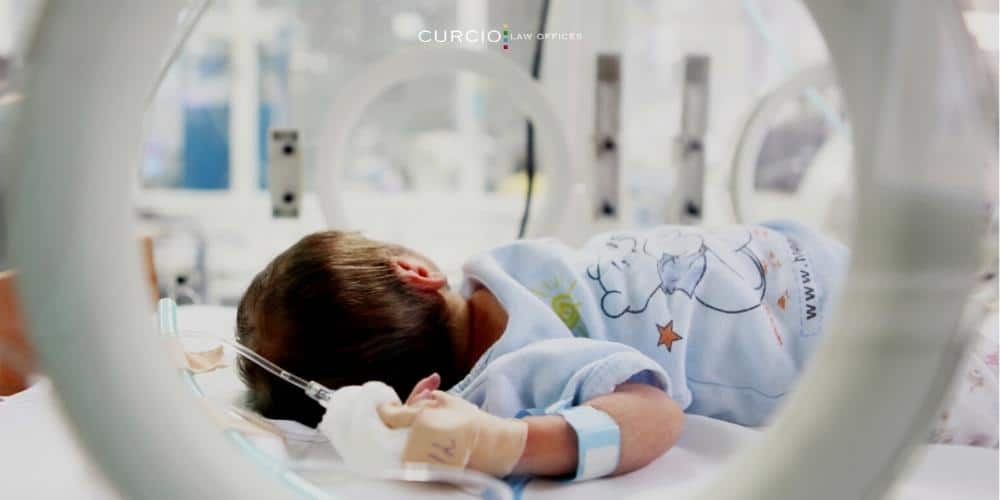CHICAGO MECONIUM ASPIRATION SYNDROME LAWYER
PRACTICE AREAS
Chicago Birth Injury Lawyer for Meconium Aspiration Syndrome
In 5% to 10% of births in the United States, newborn babies pass meconium in the amniotic fluid. In short, meconium is a baby’s first poop. While this issue doesn’t sound like a big deal, it can create major health complications for both mother and baby, especially if medical malpractice is at play. Fetal complications could begin with trouble breathing and turn into a brain injury or wrongful death. Birth injuries like this require strong legal representation from Chicago meconium aspiration syndrome lawyers at Curcio & Casciato.
If you or your baby has suffered life-threatening health complications from meconium aspiration syndrome, you may have grounds to file a birth injury lawsuit. Below, Chicago birth injury lawyers break down the specifics of this birth injury and how to know if medical malpractice played a role. For more information, call our legal team at 312-321-1111 today.

What is Meconium Aspiration Syndrome (MAS)?
Meconium is basically a baby’s first poop. It’s usually thick and dark green. Meconium Aspiration Syndrome (MAS) is a type of birth injury where the baby has a bowel movement while still inside the womb – which results in meconium in the amniotic fluid. When this happens, the amniotic fluid will have a greenish tint to it, which is called meconium staining. At any point in the birthing process, the baby could inhale the meconium in the amniotic fluid.
This can cause severe respiratory distress for the baby and infection for the mother if the situation isn’t promptly handled by medical professionals. Birth injuries often fall under the large legal umbrella of medical negligence. If you and your baby suffered major health consequences due to an improperly handled case of MAS, you may have grounds to file a birth injury lawsuit. A Chicago birth injury lawyer at Curcio & Casciato can help you take legal action.
How Common is Meconium Aspiration Syndrome?
CDC data states that approximately 3.6 million babies are born in the U.S. every year. Johns Hopkins Medicine estimates that meconium aspiration syndrome occurs in 5% to 10% of these births.
Causes of Meconium Aspiration Syndrome
In short, meconium aspiration syndrome occurs when the baby is under stress before or during birth. The most common cause of fetal stress is oxygen deprivation. Fetal distress may occur due to the following situations:
- Pregnancy that continues past the expected due date
- When the baby gets stuck in the birth canal
- Long and difficult labor
- Maternal health conditions such as diabetes, hypertension, or preeclampsia
- Maternal or fetal infection
Risk Factors for Meconium Aspiration Syndrome
The biggest risk factor for MAS is a pregnancy that goes past 40 weeks. In fact, this condition rarely occurs in preterm births. That’s because unborn babies don’t start producing large amounts of meconium until the third trimester. Amniotic fluid also starts to decrease the longer the baby stays inside the womb past its due date. This increases the risk of MAS because the meconium will be extremely concentrated in the womb. Additionally, the baby will be exposed to the meconium for a long period of time before birth.
Prevention of Meconium Aspiration Syndrome
Is Meconium Aspiration Syndrome preventable?
In short: not always. The best way to prevent MAS is to keep your body as healthy as possible during pregnancy and follow all your doctor’s instructions leading up to birth.
Doctors can help prevent MAS by inducing labor or performing a c-section if the pregnant patient goes past 40 weeks. Additionally, doctors must carefully monitor the baby’s stress levels during labor and delivery. If the baby becomes too stressed or stuck in the birth canal, doctors must act quickly. In some cases, an emergency c-section is the best solution.
It’s important to remember that MAS can still happen even if both doctor and pregnant patient do everything right.

Meconium Aspiration Syndrome Symptoms
Symptoms of meconium aspiration syndrome in newborns include:
- Cyanosis, which is a bluish skin color
- Abnormal breathing
- Green-ish amniotic fluid at birth
- Low blood pressure
- Limpness
Meconium Aspiration Syndrome Nursing Diagnosis
MAS is generally diagnosed immediately at birth based on the newborn’s symptoms. All competent medical professionals should be able to connect an infant’s trouble breathing, bluish skin color, limpness, etc. to this condition.
A healthcare provider may also run a few tests such as an arterial blood gas (ABG) test to determine if the infant is getting enough oxygen, and an x-ray to see if any meconium has entered the baby’s lungs.
Meconium Aspiration Syndrome Treatment
MAS can turn into a serious birth injury for both mother and baby if doctors don’t act fast. Below, Chicago birth injury attorneys discuss the medical care that doctors should provide immediately upon MAS diagnosis. If your doctor failed to provide quick and accurate treatment to both you and your baby, you may have grounds to file a birth injury lawsuit.
Treatment of Meconium Aspiration Syndrome for the Newborn
If the baby passes meconium before or during birth, the doctor must take immediate action by suctioning as much meconium out of the newborn’s mouth, nose, and throat as possible. If this isn’t enough to remove the meconium and improve breathing, doctors may insert a tube into the baby’s windpipe in order to suction out more fecal matter. Meconium can get deep into the lungs and even stick to the baby’s alveoli (air sacs).
If the baby is still struggling to breathe and maintain normal blood levels once all meconium has been suctioned out, doctors will provide supplemental oxygen through some sort of breathing machine. Doctors may even provide extra oxygen by inserting a breathing tube into the baby’s windpipe.
Other treatments for MAS include antibiotic therapy, a radiant warmer to maintain the baby’s body temperature, a breathing machine, tapping on the baby’s chest cavity to loosen secretions, and extracorporeal membrane oxygenation (ECMO) if the baby has high blood pressure in their lungs.
Treatment of Meconium Aspiration Syndrome for the Mother
The main health risk for the mother of a baby with MAS is infection. More specifically, an infection called Choriomnionitis can occur in mothers with meconium staining, according to a 2014 study.
Choriomnionitis is when the chorion and amnion, which are membranes that surround an unborn baby, become infected with bacteria. Mothers with this infection can develop symptoms like high fever, sweating, rapid heart rate, and unusual smelling vaginal discharge. Following MAS, doctors should treat mothers with a round of antibiotics as soon as possible.
Complications of Meconium Aspiration Syndrome
With immediate, proper care, most babies should have no health complications. In rare cases, though, babies with MAS can develop a pneumothorax – which is a collapsed lung – and pulmonary hypertension of the newborn (PPHN) – which is basically high blood pressure in the lungs.
If the baby’s respiratory distress due to MAS isn’t quickly resolved, they can also suffer permanent brain damage, which can result in cerebral palsy. Cerebral palsy is another type of birth injury that can affect a child’s mobility, posture, muscle tone, and overall development. If you believe that medical malpractice during or after birth contributed to your child’s injury, contact a Chicago cerebral palsy lawyer at Curcio & Casciato.
Damages for Medical Malpractice Associated With Meconium Aspiration Syndrome
Parents of children with birth injuries could file a medical malpractice lawsuit and recover financial compensation for the following damages:
- Past and future medical expenses
- Physical therapy expenses for the child if they suffer a severe lung injury or brain injury
- Physical pain and suffering
- Emotional distress
- Lost wages (for the parents of the injured baby)
- Caregiving expenses if the child’s case of MAS results in a permanent disability
- Expenses for necessary medical equipment (if the child has a permanent disability) such as wheelchairs, leg braces, etc.
How much compensation you receive in your birth injury lawsuit is heavily dependent on how many damages you suffer. Chicago medical malpractice lawyers at Curcio & Casciato can carefully review your medical records, medical bills, lost wages, and more to calculate an accurate settlement amount.
How Do I Know if Meconium Aspiration Syndrome Was Caused by Medical Malpractice?
As previously stated, MAS can happen even if the doctor and mother do everything right leading up to birth. But sometimes, MAS is a direct result of medical negligence. Or, complications following MAS are a direct result of medical negligence. If the following incidents happened during your pregnancy, labor, or birth, you may have grounds to file a medical malpractice case.
- The doctor failed to monitor fetal distress levels during labor and delivery.
- The doctor failed to take action when the mother surpassed 40 weeks of pregnancy (whether that is failing to monitor fetal and maternal health, failing to induce labor, failing to schedule a c-section, etc.)
- There was delayed treatment or no treatment for mother and baby immediately after birth.
- The doctor failed to diagnose MAS immediately after birth.
- As a result of the doctor’s action or inaction, the mother or baby suffered major health consequences such as infection, lung issues, brain damage, or wrongful death.
If one of the aforementioned bullet points sounds similar to your situation, you need an experienced birth injury lawyer on your side.

Call Chicago Birth Injury Lawyers at Curcio & Casciato Today
Curcio & Casciato is a top-notch personal injury law firm in Chicago, IL. Our team of Chicago birth injury attorneys have decades of combined experience in successfully litigating birth injury lawsuits such as cerebral palsy, erb’s palsy, umbilical cord prolapse, shoulder dystocia, and meconium aspiration syndrome lawsuits. Our Chicago personal injury lawyers have seen families struggle physically, emotionally, and financially due to traumatic birth injuries. When we handle birth injury cases, we bring in the best medical experts in the Chicagoland area in order to carefully analyze our clients’ medical records and help us win a fair settlement. Check out our birth injury verdicts and then give us a call at 312-321-1111. We offer a free consultation to all new clients.


